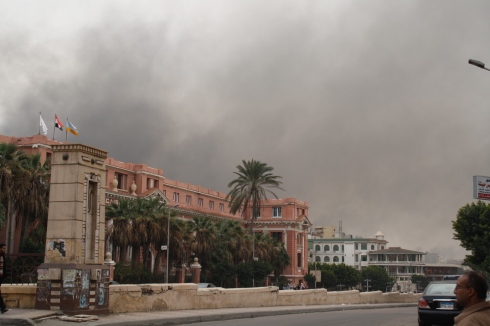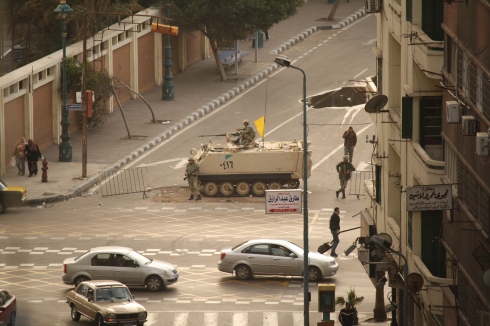It’s still difficult for me to wrap my head around the fact that one month ago, I was writing papers from my desk in Alexandria and wondering whether the Tunisian revolution would spark an uprising in Egypt. That three weeks ago I arrived in the United States, having witnessed the start of that struggle. That 13 days ago, I cheered and cried and held my breath as the strength of the Egyptian public resulted in Hosni Mubarak’s descent from his 30-year seat of power and flight from Cairo. And that in just a few days I’ll be boarding a plane back to North Africa, but that it will be the start of a new semester in a new climate and a new dialect and a new culture and a new country.
I still feel like I was wrenched from Egypt. The January 25th protests were exhilarating, even more so when they continued through the night and into the next days. I was glued to the news from Cairo and Suez and the word on the street from Alexandria. As police turned violent and we heard reports of deaths and beatings, I mostly spent time inside with my host family and friends, waiting to see what would happen. Twitter was cut off the first day, and Facebook was rumored to be next. The night of the 27th, Thursday, Facebook was gone and I got my first taste of censorship. When we woke up the next morning the internet and phone lines were cut throughout all of Egypt. I panicked. I felt helpless and trapped…no way to communicate with anyone outside my home. Hosni Mubarak, I thought, you’ve got me, I feel repressed. I sat in front of Al-Jazeera with Mama Azza and Mohab and we watched as they played over and over scenes of police vans shooting tear gas at masses of people and driving through crowds. I ventured out with Mohab and bought an international calling card, to attempt a call to the US. While we were out, Mohab and I ran a couple of errands for Mama Azza (1/2 kilo of eggplant, 1/2 kilo of green beans), and then ran a couple of our own, investigating the source of the black smoke billowing above our neighborhood. As we were walking along the Corniche, we saw one of the biggest masses of protesters yet, moving along the Corniche, blocking off Alexandria’s entire main street to cars, waving flags, throwing stones at police vans, and chanting slogans.


 We asked around a bit and found out that the smoke was from two police vans that had been set on fire, and learned that a little further down a police station had been set ablaze. As we were walking, two of the vans in question drove by, looking utterly defeated…battered and dented on every side, license plate hanging by one screw. The streets were populated by groups of people sharing stories and cell phone videos of the fires and protests. A taxi stopped in the middle of the usually-congested Corniche and its passengers got out to tape over the numbers painted on the cab and license plate, to cover up any identification numbers on the vehicle. Two boys ran past us, hiding an object in a sweater slung between them. No one was going about their daily business now. The smokey dusk was eerily quiet, and the new curfew went into effect.
We asked around a bit and found out that the smoke was from two police vans that had been set on fire, and learned that a little further down a police station had been set ablaze. As we were walking, two of the vans in question drove by, looking utterly defeated…battered and dented on every side, license plate hanging by one screw. The streets were populated by groups of people sharing stories and cell phone videos of the fires and protests. A taxi stopped in the middle of the usually-congested Corniche and its passengers got out to tape over the numbers painted on the cab and license plate, to cover up any identification numbers on the vehicle. Two boys ran past us, hiding an object in a sweater slung between them. No one was going about their daily business now. The smokey dusk was eerily quiet, and the new curfew went into effect. 
 That night they announced that the police force had left Alexandria, and we watched on tv as tanks rolled into the city; the army had been brought in to keep the peace. The next day I was supposed to be meeting friends from America at the airport in Cairo, but I still had not heard whether they were coming or not. So I packed a week’s worth of clothes just in case I heard from them and got ready to leave at a minute’s notice. It’s a good thing I did, too, as a little while later I got a call from the resident director of our program telling me they felt it would be safer if we were all together to communicate, and that they would be coming to my apartment soon to pick me up. Bag in hand I said my goodbyes to my host family, not knowing that it would be the last time I saw them before leaving Alexandria.
That night they announced that the police force had left Alexandria, and we watched on tv as tanks rolled into the city; the army had been brought in to keep the peace. The next day I was supposed to be meeting friends from America at the airport in Cairo, but I still had not heard whether they were coming or not. So I packed a week’s worth of clothes just in case I heard from them and got ready to leave at a minute’s notice. It’s a good thing I did, too, as a little while later I got a call from the resident director of our program telling me they felt it would be safer if we were all together to communicate, and that they would be coming to my apartment soon to pick me up. Bag in hand I said my goodbyes to my host family, not knowing that it would be the last time I saw them before leaving Alexandria.
We piled into a car and made our way to Andrew’s apartment. Because there were no longer police in Alexandria, civilians had stepped up to the job of traffic control and were directing cars and pedestrians, standing in the middle of every intersection. On the way, a huge protest blocked all traffic going East on the Corniche. So, cars turned around and people started forming two head-on lanes of traffic on the side of the street that was open. It was a city run by the people.
The next two days and nights were spent sequestered in Andrew’s apartment. The eight of us who were still in Alexandria at the time (everyone else had already left for the semester break), plus Andrew, and Mr. Poopsie the puppy huddled under blankets, paced, waited, wondered, and watched the world from the balcony. We had no internet, no access to news on television, and limited capability to contact people by phone. We called our Egyptian friends to make sure they were ok, and kept our phones close waiting for calls from the unlisted numbers that could be our parents or friends on the outside. We ventured out before the 4pm curfew to secure cooking supplies and made giant pots of stew and goulash. And we sat around some more…waiting for word from The Program.
We got calls from them every couple of hours, updating us on their deliberation process…first to let us know that an evacuation plan was being designed but that they weren’t sure if they would implement it. If we were to be taken out, it could be by land, sea, or by charter plane. Finally after a long first day we found out that they had indeed decided to evacuate us, and it would be by the first available flight. A few hours later another call let us know that we would be leaving on the 31st, escorted to the airport with a guard, and we would have time to go to our apartments the next day to pick up the rest of our things. The next morning turned out to be more dangerous than expected, and we only were able to get the essentials: a passport.
Outside, the civilian-run state faced its first night on the job. As we watched from our 11th floor vantage point, men began walking the darkening streets in groups of two or three, all carrying long sticks, staves, or even swords. Scary! Until, after watching for a little while, we realized that these were the good guys, the neighborhood fathers and brothers and sons banding together on each street corner to protect their own. When a car passed through the street, they stopped it and directed all traffic to the Corniche, where the army was patrolling with tanks. When gunshots sounded nearby, dozens of men sprinted to see what the problem was.
Inside we stayed busy making macaroni and cheese that someone’s mom had sent from America, knitting, reading, and watching movies. On Sunday morning we packed up early and were waiting by the door when the curfew lifted at 8am. Our dedicated teachers and the Dean of the Faculty of Humanities picked us up in the University bus to go to the airport, and we made it through army checkpoints easily, after a quick stop to grab food and water for another study abroad program whose 35 students had been stuck at the airport for 2 nights. We had two short and stressful flights, from Egypt to Jordan and from Jordan to Dubai, and then settled in for the 14 hours to America. Everyone else was going on to different destinations, so I walked out to Washington, DC to meet my parents on my own.
As I was reacquainting myself with cold weather, automatic clothes dryers and drinking tap water, and trying to stop feeling guilty flushing toilet paper, Egyptians were not giving up. I was back to my own bed, and they were setting up camp in Tahrir Square. I was at Will’s on the 11th when the uprising became a legit revolution and popular resistance finally pushed Mubarak OUT! And we don’t know what it will lead to in Egypt yet, but I don’t doubt that the people will fight for the rights and fair democratic governance that they want and deserve, and the rest of the Mid East dictators better get scared if they aren’t already.
As for me, the Program finally decided after two weeks that the best option would be to continue our program in Morocco, since we are not allowed back to Egypt as a government-funded program until it’s officially “safe” …whatever that means. I’m hoping to go back and visit my friends and host family and tie up my loose ends in Egypt after the end of the program in June, but for now I’m getting excited to spend three months in this bizarre-sounding place called Ifrane, Morocco. Alpine climate and Macaque monkeys? Alright Morocco, let’s see what you’ve got.





